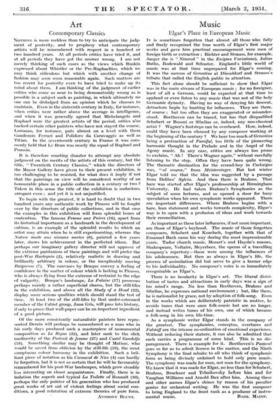Music Elgar's Place in European Music
IT is sometimes forgotten that almost all those who fully and freely recognized the true worth of Elgar's first major works and gave him practical encouragement were men of
foreign birth or extraction ; Richter and Strauss, for example, Jaeger (he is Nimrod " in the Enigma Variations), Julius Buths, Rodewald and Schuster. England's little world of music was at that time unprepared for Elgar's coming. It was the success of Gerontius at Diisseldorf and Strauss's tribute that called the English public to attention.
This fact alone should be sufficient to show that Elgar was in the main stream of European music ; for no foreigner, least of all a German, could be expected at that time to applaud or even listen to any music that was not of the holy Germanic dynasty. Having no way of denying his descent, detractors begin by hunting for influences. They are there, of course ; but too often they are exaggerated or misunder- stood. Beethoven can be traced, but has that disqualified Schubert or Busoni or Sibelius or, indeed, any neo-classical artist ? Wagner's footsteps can be overheard. How, indeed, could they have been silenced by any composer working at
the beginning of the century ? We hear too much of Gerontius being a protraction of Parsifal, too little of the pioneering harmonic thought in the Prelude and in the Angel of the Agony music. In. any case, critics are always too prone
to exclaim, " Ah ! There's Wagner again," without carefully listening to the step. Often they have been quite wrong.
The thematic diminution for the errand-boy in Cockaigne was, " of course," from Meistersinger. But last winter Elgar told me that the idea was suggested by a passage from Delibes' Sylvia. And then there is Brahma. That
hare was started after Elgar's professorship at Birmingham University. He had taken Brahms's Symphonies as the subject of some lectures, and so opened a door for busy speculation when his own symphonic works appeared. There are important differences. Where Brahms begins with a bare, lean statement and works towards complexity, Elgar's way is to open with a profusion of ideas and work towards their reconciliation.
As important as these later influences, if not more important, are those of Elgar's boyhood. The music of those forgotten composers, Schobert and Kozeluch, together with that of Emanuel Bach came his way during the most impressionable years. Tudor church music, Mozart's and Haydn's masses, Shakespeare, Voltaire, Meyerbeer, the operas of a travelling company's repertory—these were among the influences of his adolescence. But then as always in Elgar's life, the
process of assimilation did but serve to give a keener edge to his individuality. No composer's voice is so immediately recognizable as Elgar's.
There is no insularity in Elgar's art. The liberal distri- bution of tastes and attractions in early days was a sign of his mind's range. No less than Beethoven, Brahms and Sibelius, he expresses national environment ; but, like them, he is nationalist by grace, not by adoption of folk-song. Even in the works which are deliberately patriotic in motive,. he avoids tunes that were once folk-music but are no longer, and instead writes tunes of his own, one of which became a folk-song in his own life-time.
As a symphonic writer Elgar stands in the company of the greatest. The symphonies, concertos, overtures and
Falstaff are the intense co-ordination of emotional experience.
Without reducing their stature, it can also be admitted that each carries a programme of some kind. This is no dis-
paragement. There is example for it. Beethoven's Pastoral goes so far as to admit licence in the matter, and the Ninth Symphony is the final rebuke to all who think of symphonic form as being divinely ordained to hold only pure music. The symphony was made for man, not man for the symphony. We know that it was made for Elgar, no less than for Schubert, Brahms, Bruckner and Tchaikovsky before him and for Vaughan Williams and Arnold Bax after him. Among these and other names Elgar's shines by reason of his peculiar genius for orchestral writing. He was the first composer to bring England to the front rank as a producer of instru-




























































 Previous page
Previous page